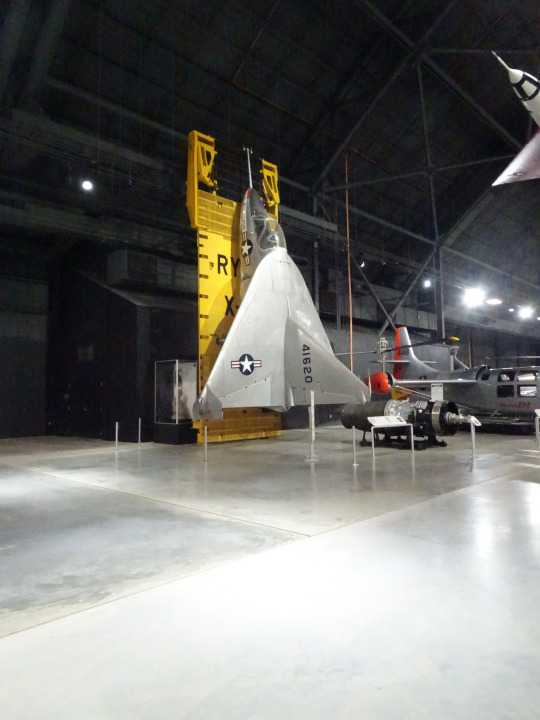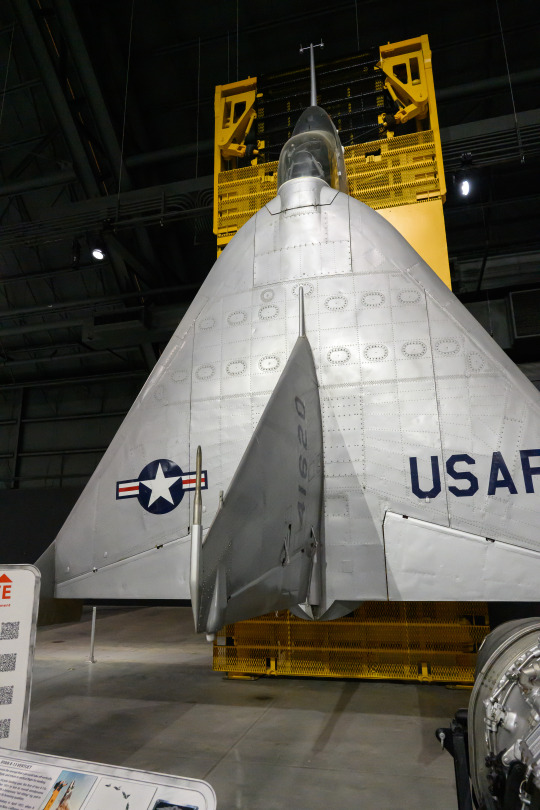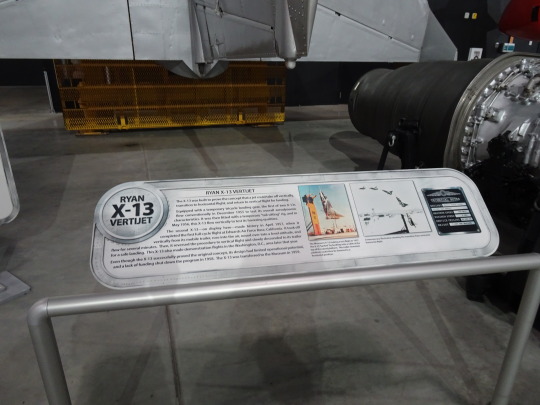#Ryan X-13 Vertijet
Explore tagged Tumblr posts
Text

In some configurations, the Ryan X-13 Vertijet had a thrust/weight ratio of a staggering 1.48 (to put this into context, the Raptor has a maximum of around 1.25)
@Hush_kit via x
11 notes
·
View notes
Text


We have now entered the Research and Development exhibit, which is where the museum's experimental aircraft that never quite took off (😉) live. Personally, I think this is one of the coolest parts of the museum because it really showcases all of the strange and wacky things that have been tried over the years to push the limits of what can be done with flight.
This is a Ryan X-13 Vertijet. As per the museum website, "The X-13 was built to prove the concept that a jet could take off vertically, transition to horizontal flight, and return to vertical flight for landing." While the craft was successful, the project was shut down due to limited operational potential and a lack of funding.
Underneath the cut is a picture of the placard in front of the Vertijet at the museum, which includes a diagram illustrating take off.

#original post#National Museum of the United States Air Force#United States Air Force Museum#aviation history#airplanes#X-13#Vertijet#experimental#Research and Development
6 notes
·
View notes
Video
RYAN X-13 VERTIJET USAF MUSEUM by ERIC SALARD
7 notes
·
View notes
Text
ryan x-13 vertijet! just saw that one recently at the usaf museum in ohio :3


43 notes
·
View notes
Text

"The Golden Age of Test Flight" by Mike Machat.
Aircraft tested at the Edwards Air Force Base.
Top row: Bell X-1, Douglas D-558-2 Skyrocket, Bell X-2, North American X-15, Space Shuttle Enterprise.
Second Row: Lockheed P-80 or T-33 Shooting Star, Boeing B-29 Super Fortress, North American F-86 Sabre, Boeing B-50 Super Fortress, North American F-100 Super Sabre, Boeing NB-52 Stratofortress, Northrop T-38 Talon, Boeing 747-100SR Mothership.
Third Row: Bell X-5, Douglas X-3 Stiletto, North American X-10, Northrop X-4 Bantam, Northrop YB-49 Flying Wing, North American XB-70A Valkyrie.
Fourth Row: Ryan X-13 Vertijet, Convair XFY Pogo, Lockheed NF-105 Starfighter, Martin X-24B, Piasecki H-21 Shawnee.
source
#Bell X-1#Douglas D-558-2 Skyrocket#Bell X-2#North American X-15#Space Shuttle Enterprise#Edwards Air Force Base#Boeing B-29 Super Fortress#North American F-86 Sabre#Boeing B-50 Super Fortress#North American F-100 Super Sabre#Boeing B-52 Stratofortress#Northrop T-38 Talon#747#Bell X-5#Douglas X-3 Stiletto#North American X-10#Northrop X-4 Bantam#Northrop YB-49 Flying Wing#North American XB-70 Valkyrie#Ryan X-13 Vertijet#Convair XFY Pogo#Lockheed F-105 Starfighter#Martin X-24B#Piasecki H-21 Shawnee#my post#United States Air Force#USAF#NASA#US Air Force#bomber
55 notes
·
View notes
Photo

After testing himself the X-13 Vertijet Ryan, test pilot Peter Girard came to his own idea of a vertical take-off and landing (VTOL) jet fighter. The Girard’s concept was based on a sort of triangular shaped rotor/wing with movable tips. The wing rotated to take off like an helicopter and when the appropriate speed was achieve it became fixed to allow high-speed flight. To counteract the rotor torque he planned to employ compressed air outlets in the tail section.
In 1962 Lockheed and Ryan found some merit in the idea and in what’s better than Lockheed’s already stunning “Zip”? Sadly, it didn’t go any further.
18 notes
·
View notes
Text
G. Verver Following
Ryan X-13A s/n 54-1620
Ryan X-13 Vertijet USAF s/n 54-1620 experimental VTOL aircraft mounted on its ground service trailer which has been raised to a 45 degree angle; Edwards Flight Test Center, Edwards Air Force Base, CA; circa April 1957. Official U.S. Air Force photo.
11 notes
·
View notes
Video
Ryan X-13A s/n 54-1620 by G. Verver Via Flickr: Ryan X-13 Vertijet USAF s/n 54-1620 experimental VTOL aircraft mounted on its ground service trailer which has been raised to a 45 degree angle; Edwards Flight Test Center, Edwards Air Force Base, CA; circa April 1957. Official U.S. Air Force photo.
6 notes
·
View notes
Text
While the Vertijet was an improvement over the other so-called "tailsitters" like the Convair POGO, it's operational profile has since been regarded as a technological dead-end for vertical takeoff and landing aircraft.
https://airandspace.si.edu/collection-objects/ryan-x-13-vertijet/nasm_A19600018000
Even so, simply that it was tried is a fascinating thing itself.

150 notes
·
View notes
Photo

Ryan X-13 Vertijet-1955 #spaceage #cool #design #art #style #retro #rocket #space #nasa #inspiration #atomic #photo #60s #computer #technology #vintage #architecture https://www.instagram.com/p/CD45uhPh7IA/?igshid=wzze3zq5vl14
#spaceage#cool#design#art#style#retro#rocket#space#nasa#inspiration#atomic#photo#60s#computer#technology#vintage#architecture
0 notes
Photo

The Ryan X-13 Vertijet (company designation Model 69) was an experimental vertical take-off and landing (VTOL) aircraft flown in the United States in 1955. The main objective of the project was to demonstrate the ability of a pure jet to vertically takeoff, hover, transition to horizontal forward flight, and vertically land. http://bit.ly/2WkT6Y3
0 notes
Photo

1950's EXPERIMENTAL RYAN X-13 VERTIJET Vintage OFFICIAL US AIR FORCE Photo BUY IT NOW – 1950's EXPERIMENTAL RYAN X-13 VERTIJET Vintage OFFICIAL US AIR FORCE Photo
0 notes





